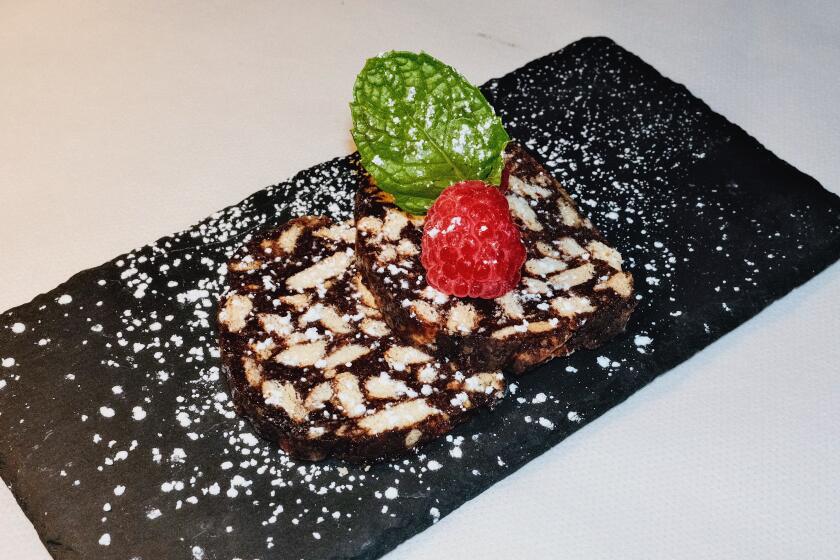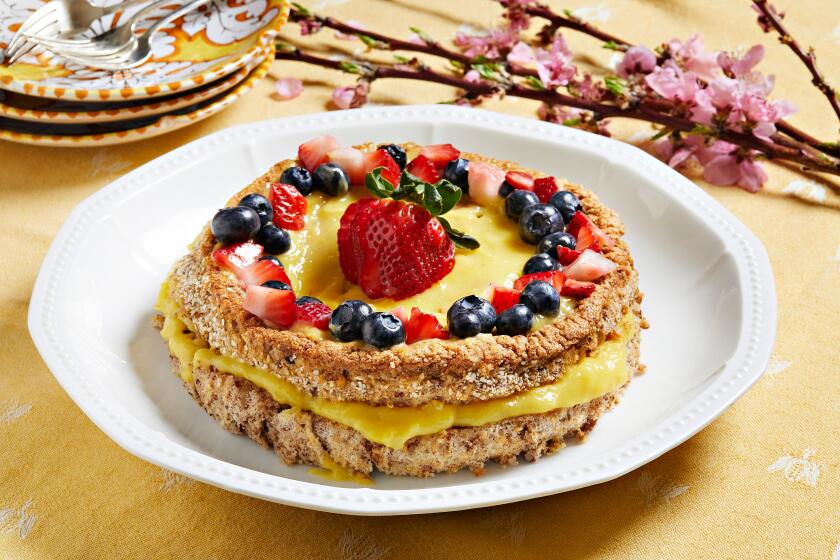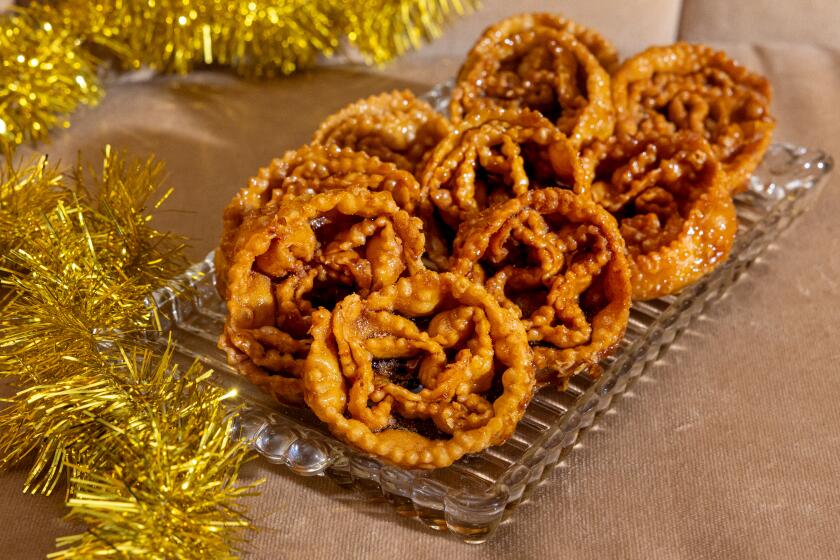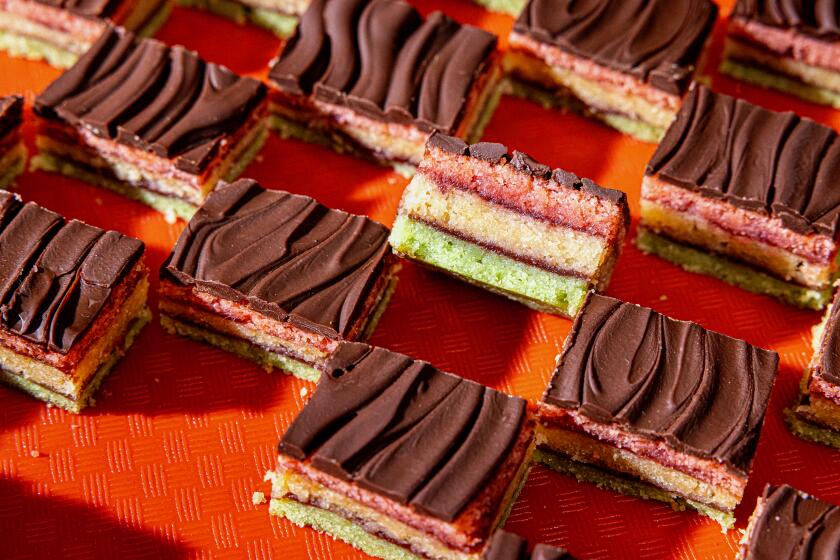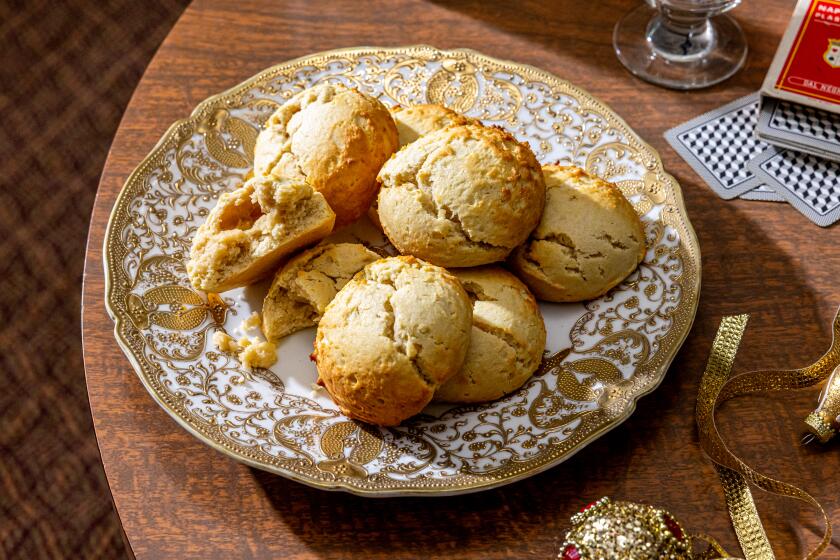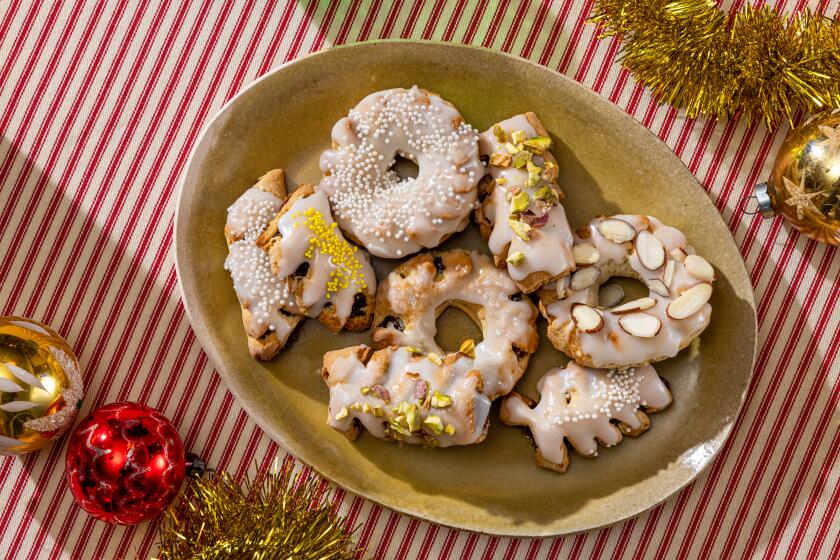Cherimoya gelato
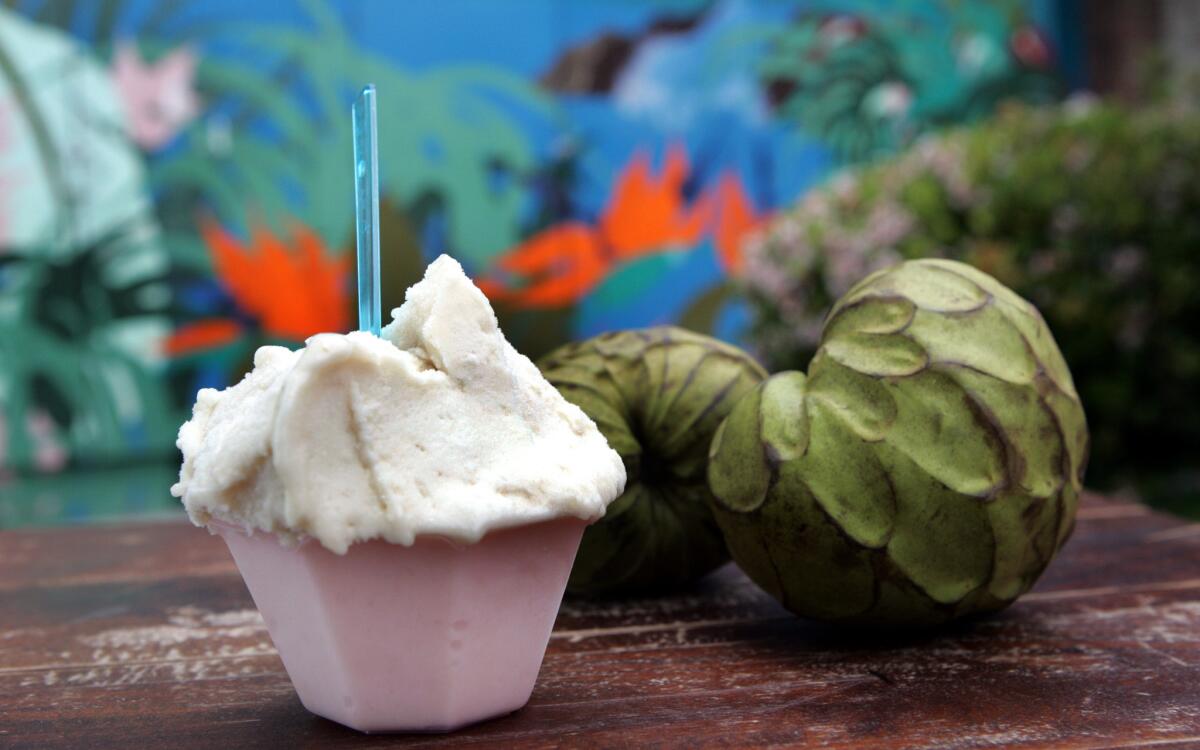
- Share via
LEO BULGARINI is a little obsessed with gelato. The Rome-born ex-sommelier and his wife, Elizabeth Foldi, spent two years scouring villages throughout Italy seeking those who still made gelato the old way, using not pastes and premade bases, but fresh ingredients.
Seeking the right pistachios for the gelato they make in their new Altadena gelateria, they traveled from Rome to Sicily, finding them at last in the little town of Bronte. California pistachios, he says, don’t have the right depth of flavor. Toasted in the oven, then crushed in an old-fashioned peanut butter grinder, the Sicilian pistachios go into a gelato that’s dense and creamy, with a rich, earthy flavor and a raspy texture that reminds you just how distinctive the nuts are. It is just as wonderful as his cantaloupe sorbetto spiked with Tanqueray gin, that, he says, gives the sorbetto “extra oomph and a certain depth.”
Bulgarini and a few others in and around Los Angeles are taking gelato and ice cream to a whole new level. At Milk in West Hollywood, a Patina Group chef is giving old-fashioned ice cream the kind of devoted attention he used to give to a smoked sturgeon and potato terrine. Gelato Bar in Studio City is updating classic Italian gelato with fresh California ingredients. The results couldn’t be more delicious.
It’s not the first time gelato has been in the spotlight in Los Angeles -- in the late ‘80s there was a gelateria craze. But this generation of artisans, joined by an ice cream maker or two, is taking the craft to something that seems more like an art. They’re perfecting techniques to get the purest flavor and creamiest texture, seeking out the ripest peak-season fruit, the best chocolate, the most flavorful, freshest nuts.
Gelato -- Italian ice cream -- is denser and less rich than most American ice cream, often with more intensity of flavor. Less air is incorporated into it, and it has a lower butterfat content than ice cream, largely because of a preference for milk over cream.
Bulgarini, who until 2006 worked as a consulting sommelier at Tre Venezie in Pasadena, first made gelato when he was a child in Rome, with his uncle. He and Foldi were determined, when they came up with the idea of opening a gelateria, to learn to make gelato the old-fashioned way. “The artisan is dying out,” Bulgarini says. “Both here and in Italy.”
In search of excellence
IT wasn’t easy finding worthy teachers. “In Rome right now there are about eight gelaterias that make it from scratch,” Bulgarini says. “Maybe 99% of gelato in Italy is industrial,” adds Foldi, a Pasadena native who gave up her career as a litigator to make gelato. “It was killing her soul,” says her husband.
At last they found the gelato genius they were looking for in 82-year-old Guido Luca Cavieziel, a third-generation gelato maker, in retirement in the Sicilian town of Catania. In the two months he spent with Bulgarini and Foldi, he taught them the formulas he used to make superlative gelati. The distinctive creaminess of gelato comes from ingredients combined in specific proportion to each other. “If you do the math, you don’t have to add a bunch of junk,” Bulgarini says. Just the freshest fruit, the best nuts, the purest milk (Bulgarini’s comes from Broguiere’s Dairy in Montebello).
They opened their shop, Bulgarini Gelato, in a pretty courtyard under the looming San Gabriel mountains, just 11 days ago. (Before he opened in Altadena, Bulgarini wandered with his gelato cart from venue to venue for a year, peddling from the Pacific Asia Museum to Caltech to Pasadena’s Laemmle Playhouse 7 movie theater.)
The gelateria has the charm of an airy farmhouse kitchen, with rustic painted furniture and shelves filled with jars of brightly colored amaretti and Italian chocolates. A beautiful copper Elektra espresso machine and a vintage 1960s granita maker the couple had shipped from Rome are more like architectural still lifes than machinery.
Bulgarini changes flavors daily, depending on what he and Foldi bring back from trips to local farms -- or what they pack in their suitcase during frequent trips to Italy. Raspberries from Santa Barbara go into an intensely flavored raspberry sorbetto. Marsala from Sicily sets the zabaglione gelato apart; Ojai cherimoyas from Santa Barbara Farmers Market make spectacular tropical gelato.
Gail Silverton, who opened Gelato Bar with partner and fiance Joel Gutman in September, is just as obsessed as Bulgarini, but she leaves the gelato making to Allessandro Fontana, a gelato specialist who came to Los Angeles from Venice in August.
Silverton creates the gelato flavors in consultation with Fontana. Some are her takes on old favorites, like the beautifully perfumed strawberry sorbetto made with strawberries she gets from local farmers markets. “Some we just invent,” Silverton says. Like cinnamon basil or black sesame gelato, or a vanilla gelato with ribbons of dark chocolate and candied orange peel. Or the creamy chocolate sorbetto that Silverton loves to pair with a blood orange sorbetto Fontana makes with the oranges from his backyard tree. “That’s my favorite combination,” Silverton says.
Silverton’s original plan was to make her own gelato. She’d just completed a gelato-making class given by Carpagiani, an Italian gelato machine manufacturer. When she learned her new storefront wasn’t equipped with enough power to run her gelato machines, the Carpagiani people put her in touch with Fontana. He makes Silverton’s gelato at a facility in Burbank, though the two have been talking about opening a shop of their own. “Of course we want to make it in-house,” Silverton says. “We’ve wanted that since the beginning.”
Silverton’s Studio City shop reflects not her childhood in Los Angeles as much as her adulthood, much of it spent in Umbria. The ambience is all Italy: tiled floors, an indoor stone fountain, marble-topped counters, cafe tables and, on Thursday afternoons, free Italian lessons given by the same expat Italian woman who gives Silverton her lessons. Though Silverton’s background is in education, not food, (she runs the Neighborhood School, a private preschool in the San Fernando Valley) gelatomania seems to run in the family: At her sister Nancy Silverton’s Pizzeria Mozza, all but one of the desserts involves gelato, made on site by Nancy and pastry chef Dahlia Narvaez.
*
Dreamy ice cream
BUT passion for frozen desserts doesn’t stop with gelato; at Milk, American ice cream gets the epicurean treatment. Big glass cases display a dozen house-made ice cream flavors such as coffee toffee made with house-made toffee candy, dense Vahlrona chocolate, and mango, made from ripe fruit that chef-owner Bret Thompson picks up in an Asian market near his home. There are also macaron-encased ice cream sandwiches; hand-dipped ice cream bonbons; ice cream cakes; and homey pastries -- and a nook for glass milk-bottle returns.
Thompson says he wanted “a small-town little shop” when he switched gears after a decade in fine dining with the Patina Group, where he was executive chef. A 1950s Ohio soda shop, that is, with its own pastry chef -- Patina-trained Richard Yoshimura -- and storefront in the middle of chic West Hollywood.
“It’s fun to do saffron ice cream like I did at Patina,” Thompson says, “but I wanted to get back to my childhood.” Thompson, who grew up in Chatsworth, says he got excited when he watched the Pinkberry craze hit and started thinking about how he could bring his European training to something as “accessible and All-American” as ice cream.
And then there’s Caffe Primo, the glitzy new gelateria in the Millennium Plaza on Sunset Strip. Owner Tony Riviera closed his 2-year-old Primo Gelato store and moved across the piazza into larger digs, opening Caffe Primo in December. This is gelato gone Hollywood, with two flat-screen televisions set to shows like “The Tyra Banks Show” and tourists trying to spot celebrity regulars (Riviera keeps a miniature French press for Jeremy Piven under his two orange La Marzocco espresso machines).
Even the flavors are Hollywood glam, left coast fusion all the way: coconut-mango, chile-chocolate and, in season, white truffle. And, for “adults only,” a Cabernet-pomegranate sorbetto and a gelato made from pink Champagne.
So where is this all headed? This summer may see new openings: Pazzo Gelato has plans for a second store in the Arts District downtown, and Riviera says he’s also going to open a new store downtown. Gail Silverton is already looking to open another shop. “Maybe the Westside,” she says. “We have so many people coming over from Brentwood with coolers.”
And Thompson? “We’re going to get an ice cream truck,” he says. “One of those old-school milk trucks, something very nostalgic.”
Imagine West Hollywood traffic slowing not for a movie shoot or an errant celebrity -- but for cars to stop for a most fabulous ice cream cone.
In a blender or food processor, puree the cherimoya until smooth and set aside.
In a large saucepan, mix the sugar, egg yolks and milk together over medium-high heat, stirring constantly. Do not boil.
After about 30 minutes on the stove (the mixture will have thickened into a custard while simmering), remove the pan from the heat and pour the mixture through a cheesecloth into a bowl set into an ice bath. Stir as the mixture cools.
When the custard has cooled to 40 degrees, take it out of the ice bath and blend it in a blender with the cherimoya puree. You may do this in batches if your blender is small.
Freeze in an ice cream maker according to the manufacturer’s instructions. Spread it evenly into a container with a lid, cover the surface of the ice cream with plastic wrap and then the lid and freeze it for at least 5 hours, or overnight. Makes 5 cups.
Get our Cooking newsletter.
Your roundup of inspiring recipes and kitchen tricks.
You may occasionally receive promotional content from the Los Angeles Times.











